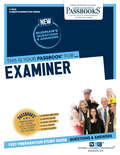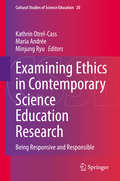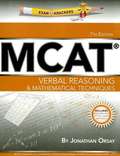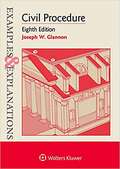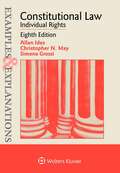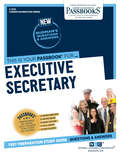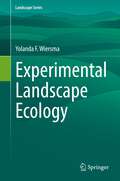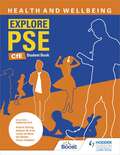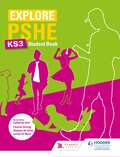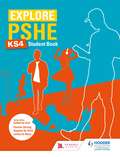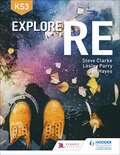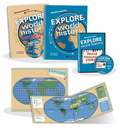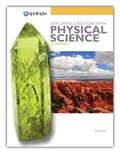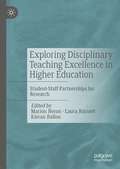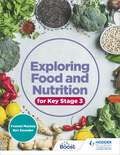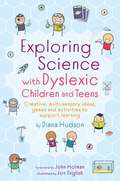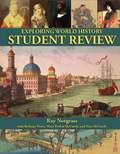- Table View
- List View
Examiner: Passbooks Study Guide (Career Examination Series #C-140)
by National Learning CorporationThe Examiner Passbook® prepares you for your test by allowing you to take practice exams in the subjects you need to study. It provides hundreds of questions and answers in the areas that will likely be covered on your upcoming exam.
Examining Ethics in Contemporary Science Education Research: Being Responsive and Responsible (Cultural Studies of Science Education #20)
by Kathrin Otrel-Cass Maria Andrée Minjung RyuThis book poses questions on how to work ethically in research on science education. Applying research ethics reflectively and responsibly is fundamental for conducting research with people. It seeks to renew the conversation on how and why to engage with ethics in science education research and to adjust and refine research practices. It highlights both the need for methodological reflections in science education research and the particular ethical research challenges of science education. Science education research involves the study of people – often young and vulnerable people – and their practices. Researchers working within humanities and social science research commonly follow guidelines and codes of conducts set by country-specific ethics committees. Such guidelines function as minimal requirement for ethical reflection. This book seeks to engage the community of science education researchers in a conversation on ethics in science education moving beyond the mere compliance with governmental regulations toward a collective reflection. It asks the question of whether the existing guidelines provided for researchers are keeping up with contemporary realities of the visual presence of individuals in digital spaces. It also asks questions on how participatory research methodologies alters the relations between researchers and practitioners. This book is organized into two parts: Part one is entitled Challenging existing norms and practices. It asks questions such as: What are the conditions of knowledge that shape ethical decision making? Where is this kind of knowledge coming from? How is this knowledge structured, and where are the limitations? How can we justify our beliefs concerning our ethical research actions? Part two Epistemological considerations for ethical science education research centres norms and practices of conducting science education research in regard to methods, validity and scope.
Examkrackers MCAT Verbal Reasoning & Mathematical Techniques
by Jonathan OrsayA collection of review books with clear and concise explanations of all science concepts and formulas tested by the MCAT including practice passages and questions.
Examkrackers MCAT: Biology
by Jonathan OrsayThis manual contains all the biology tested on the MCAT and more. It contains more biology than is tested on the MCAT because a deeper understanding of basic scientific principles is often gained through more advanced study. In addition, the MCAT often presents passages with imposing topics that may intimidate the test-taker. Although the questions don't require knowledge of these topics, some familiarity will increase the confidence of the test-taker.
Examkrackers MCAT: Chemistry
by Jonathan OrsayThis manual contains all the inorganic chemistry tested on the MCAT and more. It contains more chemistry than is tested on the MCAT because a deeper understanding of basic scientific principles is often gained through more advanced study.
Examkrackers MCAT: Physics
by Jonathan OrsayThis manual contains all the physics tested on the MCAT and more. It contains more physics than is tested on the MCAT because a deeper understanding of basic scientific principles is often gained through more advanced study. In addition, the MCAT often presents passages with imposing topics that may intimidate the test-taker. Although the questions don't require knowledge of these topics, some familiarity will increase the confidence of the test-taker.
Examples and Explanations for Civil Procedure
by Joseph W. GlannonA favorite classroom prep tool of successful students that is often recommended by professors, the Examples & Explanations (E&E) series provides an alternative perspective to help you understand your casebook and in-class lectures. Each E&E offers hypothetical questions complemented by detailed explanations that allow you to test your knowledge of the topics in your courses and compare your own analysis. <P><P> Here's why you need an E&E to help you study throughout the semester: Clear explanations of each class topic, in a conversational, funny style. Features hypotheticals similar to those presented in class, with corresponding analysis so you can use them during the semester to test your understanding, and again at exam time to help you review. It offers coverage that works with ALL the major casebooks, and suits any class on a given topic. The Examples & Explanations series has been ranked the most popular study aid among law students because it is equally as helpful from the first day of class through the final exam.
Examples and Explanations for Constitutional Law: Individual Rights (Examples and Explanations Series)
by Simona Grossi Christopher N. May Alan IdesA favorite classroom prep tool of successful students that is often recommended by professors, the Examples & Explanations (E&E) series provides an alternative perspective to help you understand your casebook and in-class lectures. Each E&E offers hypothetical questions complemented by detailed explanations that allow you to test your knowledge of the topics in your courses and compare your own analysis. <p><p> Here's why you need an E&E to help you study throughout the semester: <p> Clear explanations of each class topic, in a conversational, funny style. <p> Features hypotheticals similar to those presented in class, with corresponding analysis so you can use them during the semester to test your understanding, and again at exam time to help you review. <p> It offers coverage that works with ALL the major casebooks, and suits any class on a given topic. <p><p> The Examples & Explanations series has been ranked the most popular study aid among law students because it is equally as helpful from the first day of class through the final exam.
Executive Secretary: Passbooks Study Guide (Career Examination Series)
by National Learning CorporationThe Executive Secretary Passbook® prepares you for your test by allowing you to take practice exams in the subjects you need to study. It provides hundreds of questions and answers in the areas that will likely be covered on your upcoming exam, including but not limited to: office and secretarial practices, including keyboarding; office record keeping; English grammar usage and punctuation; spelling; administrative supervision; and more.
Experimental Landscape Ecology (Landscape Series #29)
by Yolanda F. WiersmaThis book offers the first guide to landscape ecologists on the art and science of doing experiments, both observational and manipulative. How do you conduct an experiment when your study subject is as big as a landscape? Issues of scale, spatial heterogeneity and limitations on replication may challenge scientists seeking to carry out robust experiments in landscape ecology.Beginning with an overview of the history and philosophy of the scientific method, and tracing the development of experimental approaches in ecology broadly, the first half of the book discusses the broader issues of what makes a good experiment. Individual chapters describe unique aspects of landscape ecology that present challenges to experimentation, with suggestions for solutions on issues of scale, and how to apply controls, randomization and adequate replication in a landscape setting.The second half of the book describes different kinds of landscape ecology experimental approaches including: large-scale manipulations experimental model landscapes mesocosms and microcosms in silico experiments novel landscapes Each chapter describes the advantages and disadvantages of each approach, and identifies the types of landscape ecology concepts and questions that a research can address. Examples from around the world, in a myriad of different environments, help to illustrate the ideas in each chapter. Together with an annotated resources section, this book aims to stimulate ideas and inspire creativity for graduate students and early career researchers who want to conduct better experiments in landscape ecology.
Explore PSE: Health and Wellbeing for CfE Student Book
by Ian Geddes Calum Campbell Stephen De Silva Pauline Stirling Lesley de MezaSyllabus: CfE (Curriculum for Excellence, from Education Scotland) and SQALevel: BGE S1-3 (Second, Third and Fourth Levels), National 4 and National 5Subject: PSE (Health and Wellbeing)Empower Scotland''s young people to feel prepared for the opportunities and challenges of adult life.Exploring topics such as mental health, sex, identity, community and planning for your future, this book develops students'' life skills, knowledge and resilience as they learn about themselves and others.> Create a supportive environment where sensitive issues can be discussed confidently and constructively, using the book to provide stimulus material and structure> Follow an active learning approach with starter activities to get students thinking, visual sources and written extracts to encourage conversations, and hundreds of activities for individual, pair and group work> Monitor students'' progress through learning outcomes for each lesson/series of lessons and numerous activities that create opportunities for assessment for learning and evidence of achievement> Suit your students and your timetable, with topics that can be covered in any order and double-page spreads that can be delivered across one or two lessons> Rest assured that all content in the book is linked to the CfE Benchmarks and Experiences & Outcomes for Health and Wellbeing: Personal and Social Education, as well as the GIFREC and SHANARRI principles
Explore PSE: Health and Wellbeing for CfE Student Book
by Ian Geddes Calum Campbell Stephen De Silva Pauline Stirling Lesley de MezaSyllabus: CfE (Curriculum for Excellence, from Education Scotland) and SQALevel: BGE S1-3 (Second, Third and Fourth Levels), National 4 and National 5Subject: PSE (Health and Wellbeing)Empower Scotland's young people to feel prepared for the opportunities and challenges of adult life.Exploring topics such as mental health, sex, identity, community and planning for your future, this book develops students' life skills, knowledge and resilience as they learn about themselves and others.> Create a supportive environment where sensitive issues can be discussed confidently and constructively, using the book to provide stimulus material and structure> Follow an active learning approach with starter activities to get students thinking, visual sources and written extracts to encourage conversations, and hundreds of activities for individual, pair and group work> Monitor students' progress through learning outcomes for each lesson/series of lessons and numerous activities that create opportunities for assessment for learning and evidence of achievement> Suit your students and your timetable, with topics that can be covered in any order and double-page spreads that can be delivered across one or two lessons> Rest assured that all content in the book is linked to the CfE Benchmarks and Experiences & Outcomes for Health and Wellbeing: Personal and Social Education, as well as the GIFREC and SHANARRI principles
Explore PSHE for Key Stage 3 Student Book
by Stephen De Silva Pauline Stirling Lesley de MezaDevelop your students' skills and understanding of PSHE and encourage an active learning approach, all whilst providing essential coverage of the 2020 statutory guidelines.The flexible design of this KS3 student book is compatible with whichever way your school delivers PSHE. User-friendly for both experienced PSHE Leads and for non-specialist teachers, it is packed full lesson outcomes and starter sections, as well as lot of activities students can get involved in.- Provide the right level of knowledge and understanding of PSHE education students need with this KS3 Student Book that has topic suitability for this age range- Learning outcomes at the start of every lesson, along with a short activity to introduce students to the topic and get them thinking provides an easy way in to every lesson- Source-based activities support an activity-based learning scheme that is accessible to students of all abilities
Explore PSHE for Key Stage 3 Student Book
by Stephen De Silva Pauline Stirling Lesley de MezaDevelop your students' skills and understanding of PSHE and encourage an active learning approach, all whilst providing essential coverage of the 2020 statutory guidelines.The flexible design of this KS3 student book is compatible with whichever way your school delivers PSHE. User-friendly for both experienced PSHE Leads and for non-specialist teachers, it is packed full lesson outcomes and starter sections, as well as lot of activities students can get involved in.- Provide the right level of knowledge and understanding of PSHE education students need with this KS3 Student Book that has topic suitability for this age range- Learning outcomes at the start of every lesson, along with a short activity to introduce students to the topic and get them thinking provides an easy way in to every lesson- Source-based activities support an activity-based learning scheme that is accessible to students of all abilities
Explore PSHE for Key Stage 4 Student Book
by Philip Ashton Stephen De Silva Lesley de MezaDevelop your students' skills and understanding of PSHE and encourage an active learning approach, all whilst providing essential coverage of the 2020 statutory guidelines.The flexible design of this KS4 student book is compatible with whichever way your school delivers PSHE. User-friendly for both experienced PSHE Leads and for non-specialist teachers, it is packed full lesson outcomes and starter sections, as well as lot of activities students can get involved in.- Provide the right level of knowledge and understanding of PSHE education pupils need with this KS4 Student Book that has topic suitability for this age range.- Learning outcomes at the start of every lesson, along with a short activity to introduce students to the topic and get them thinking provides an easy way in to every lesson - Source-based activities support an activity-based learning scheme that is accessible to students of all abilities
Explore PSHE for Key Stage 4 Student Book
by Philip Ashton Stephen De Silva Lesley de MezaDevelop your students' skills and understanding of PSHE and encourage an active learning approach, all whilst providing essential coverage of the 2020 statutory guidelines.The flexible design of this KS4 student book is compatible with whichever way your school delivers PSHE. User-friendly for both experienced PSHE Leads and for non-specialist teachers, it is packed full lesson outcomes and starter sections, as well as lot of activities students can get involved in.- Provide the right level of knowledge and understanding of PSHE education pupils need with this KS4 Student Book that has topic suitability for this age range.- Learning outcomes at the start of every lesson, along with a short activity to introduce students to the topic and get them thinking provides an easy way in to every lesson - Source-based activities support an activity-based learning scheme that is accessible to students of all abilities
Explore RE for Key Stage 3
by Jan Hayes Steve Clarke Lesley ParryEngage students with religion, philosophy and ethics at Key Stage 3 and encourage them to develop the skills they need to succeed at GCSE.This accessible Student Book is designed to provide a firm foundation for the reformed GCSE specifications, while still allowing you to teach a broad and balanced KS3 curriculum.- Easily introduce a new scheme of work for KS3 with this cost-effective, single-book course that provides 120 ready-made lessons that can be used flexibly over a 2-year or 3-year KS3- Teach KS3 RE with confidence whatever your level of expertise; this structured course is ready to pick up and teach whether you are an RE specialist or new to teaching the subject- Capture your students' interest with engaging lessons and activities that will encourage them to pursue Religious Education at GCSE- Lay the groundwork for GCSE, equipping your students with a solid grasp of the six major world religions, as well as the core philosophical and ethical issues- Test knowledge and understanding with regular formative assessments that enable students to keep track of their progress throughout the course- Prepare your students for assessment at GCSE, with practice questions for each lesson designed to build the confidence, understanding and evaluative skills needed for GCSE success
Explore World History
by Don Bastian Tom KinneyThe Student Book has 15 chapters divided into 3 types: Keys to History, Historical Eras, and Historical Themes. Key chapters feature World Geography, Study Tools, and Biographies. The 6 Era chapters follow a chronology from Early Humans to Modern Times. Theme chapters focus on major historical concepts, like Agriculture or Trade, and are linked to a particular era. Chapters follow a consistent format: Introduction, Vocabulary, Big Idea, Important Topics, Review, and Write About It. The simplified text is heavily illustrated and intended to be read to students who are nonreaders. Students are frequently presented with important study tools like timelines, maps, and tables.
Exploring Creation with Physical Science
by Vicki DincherYou are about to start an amazing journey of discovering a lot about the world around you. This text contains 15 chapter-modules. Each module should take you about 2-2 1/2 weeks to complete, working 4 days per school week for about 45 minutes to an hour. At this pace, you will complete the course in 34 weeks. Since most people have school years that are longer than 34 weeks, there is some built in “flex time.” Exploring Creation with Physical Science, 3rd Edition, is revised and updated from a previous edition authored by Jay Wile.
Exploring Disciplinary Teaching Excellence in Higher Education: Student-Staff Partnerships for Research
by Laura Barnett Kieran Balloo Marion HeronThis book explores disciplinary teaching excellence through a diverse range of student-staff partnership research projects. Despite being a highly contested term, ‘teaching excellence’ is something that universities aspire to and are expected to have. However, the editors and contributors argue that not only are definitions of excellence often broad and generic, but they lack nuanced understandings of disciplinary excellence in higher education. This book begins by unpacking some of these contested definitions of teaching excellence, followed by a series of co-authored chapters produced by students and staff who have undertaken research projects where they examine teaching excellence in their respective disciplinary areas. These chapters demonstrate that teaching excellence may be better understood as a process of becoming that is achieved through partnership between teachers and students. This book will be of interest and value to students, educators, and policy-makers concerned about teaching excellence, as well as scholars of student-staff partnerships.
Exploring Economics Student Review
by NotgrassThe Exploring Economics Student Review Pack is a tool to measure the students’ progress. It includes three books: The Student Review, the Quiz and Exam Book, and the Answer Key. This material is intended to enhance the students’ study of economics. Students learn Biblical teachings about economics from the Old and New Testaments and a history of the U.S. economy. The curriculum emphasizes the contrast between command economies and free markets.
Exploring Food and Nutrition for Key Stage 3
by Yvonne Mackey Bev SaunderCombine the essential ingredients that will develop knowledge, understanding and cooking skills through Key Stage 3, so students are ready for the new GCSE in Food Preparation and Nutrition. With topics linked directly to the new GCSE specifications, Exploring Food and Nutrition helps you to build knowledge and understanding of key concepts and introduce important terminology as your students progress through Key Stage 3, providing a solid foundation for the Food Preparation and Nutrition GCSE.- Develop topic understanding through Key Stage 3, drawing on subject content at GCSE, with engaging, carefully timed and level-appropriate lessons- Build food preparation and cooking skills required at GCSE with 'Skills focus': from basic skills at Year 7 through to more advanced techniques in Year 9- Encourage subject interest with suggested activities and 'Find out more' research features for each topic, that are appropriate for your students in years 7, 8 and 9- Ensure nutritional understanding with clear explanation of the up-to-date terminology, data and concepts that students will need to know in order to apply the principles of healthy eating - Monitor and measure student progress with knowledge check questions provided for every topic
Exploring Food and Nutrition for Key Stage 3
by Yvonne Mackey Bev SaunderCombine the essential ingredients that will develop knowledge, understanding and cooking skills through Key Stage 3, so students are ready for the new GCSE in Food Preparation and Nutrition. With topics linked directly to the new GCSE specifications, Exploring Food and Nutrition helps you to build knowledge and understanding of key concepts and introduce important terminology as your students progress through Key Stage 3, providing a solid foundation for the Food Preparation and Nutrition GCSE.- Develop topic understanding through Key Stage 3, drawing on subject content at GCSE, with engaging, carefully timed and level-appropriate lessons- Build food preparation and cooking skills required at GCSE with 'Skills focus': from basic skills at Year 7 through to more advanced techniques in Year 9- Encourage subject interest with suggested activities and 'Find out more' research features for each topic, that are appropriate for your students in years 7, 8 and 9- Ensure nutritional understanding with clear explanation of the up-to-date terminology, data and concepts that students will need to know in order to apply the principles of healthy eating - Monitor and measure student progress with knowledge check questions provided for every topic
Exploring Science with Dyslexic Children and Teens: Creative, multi-sensory ideas, games and activities to support learning
by Diana HudsonThis book is a collection of ideas, activities and approaches for science learning, to support kids with learning differences aged 9+ to grow in confidence, recall and understanding. The multi-sensory and fun ideas and activities can be adapted to suit individual students' needs and skills, and curriculum stage. Written by an experienced science teacher, the book includes mnemonics, art, drama and poetry activities, board games, card games, and more. All of these strategies will aid neurodiverse students' science learning and memory through boosting their creative thinking, encouraging a play-based and exploratory approach to science. Whether you want to get creative, play a game or try out a fun experiment, you can dip in and out of the activities to suit your student's unique learning style. The activities in the book will help creative thinkers who learn differently to take alternative approaches to tricky topics, grasping a fundamental understanding of key scientific concepts, whilst gaining confidence as the scientists of tomorrow.
Exploring World History Student Review
by Ray NotgrassThe Exploring World History Student Review Book is part of the Notgrass Exploring World History one-year high school curriculum. It includes review questions (covering each lesson, selected readings from In Their Words, and each of the recommended works of literature), commentary on Bible readings, and literary analysis of the twelve titles suggested for students.
